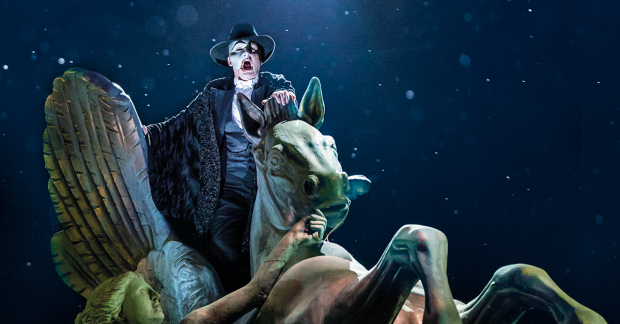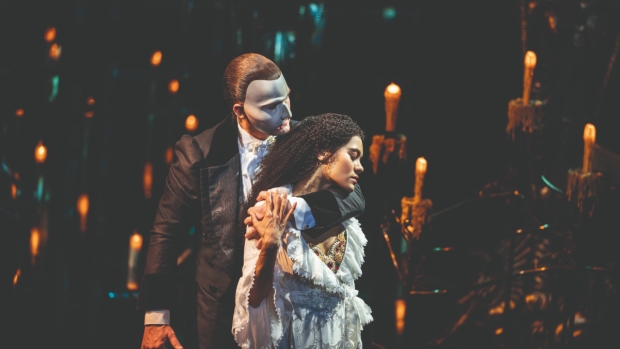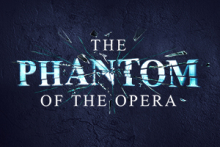The Phantom of the Opera at Her Majesty's Theatre – review

© Johan Persson
Phantom phans are a vociferous, impassioned bunch and there was much concerned online chatter when it became clear that "The Brilliant Original" (as the marketing blurb used to have it, and it's hard to disagree) was going to be returning post-pandemic with a depleted orchestra and a somewhat re-designed physical production. Would it sound as good? Will it still look as impressive? The short answers to those questions are, respectively, alas not completely, and HELL YES.
To lead with the positive, the re-vamped Phantom 'look' is essentially only a spruce and polish up of Maria Björnson's award-winning masterpiece of design. The sumptuously beautiful costumes are still intact, as are the gorgeous swags that swoop and part to reveal yet another opulent, atmospheric setting (which now slide into place slickly and silently, by the way, unlike in the latter stages of the original run when the out-of-view racket on an off night could sound like a tube train collision).
The audience still "ooh" and "aah" at the magical reveal of the "Masquerade" staircase at the top of act two, and the candlelit descent into the Phantom's lair remains mysterious and head-turningly seductive. The time-travelling transformation of the theatre from shrouded dilapidation to burnished splendour during the Overture is technically more elaborate than previously and while purists may argue that the extension of the set into the auditorium compromises director Harold Prince's hallowed "black box" aesthetic, it is so exquisitely done that it feels churlish to complain.
So, that's the wow factor triumphantly vindicated …now for the woe factor. OK, I'm kidding, but only slightly: part of the extraordinary joy of the original Phantom was its 27 piece orchestra which gave Andrew Lloyd Webber's breathtakingly romantic score a grandeur, a blissfully transporting swell and expanse that sounded like something you might hear in an actual opera house. Lloyd Webber and David Cullen's new orchestrations, for 14 pieces, sound perfectly fine in the quieter moments, or the intentionally electronic ones (the still-enthralling title song) but miss the satisfying, heart-on-the-sleeve extravagance this most Puccini-esque of scores ideally requires, particularly in the second half. It doesn't always sweep you away as it should.

© Johan Persson
Killian Donnelly's superbly sung Phantom nails all of the difficult money notes (his "Music of the Night" is outstanding) but seldom feels sufficiently authoritative in his majestic moments nor tragic enough in his broken ones. Rhys Whitfield as Raoul, the Vicomte who steals heroine Christine's heart, sings with a lovely, supple baritone and convincingly conveys an air of entitlement without becoming obnoxious. Noticeably younger than some of his predecessors in the role, his callowness mitigates slightly the dated trope of empowered men squabbling over an apparently defenceless woman.
Not that Lucy St Louis's captivating Christine comes across as a victim: skilfully differentiating between sections where she's in trance-like thrall to the Phantom and an earthier relationship with Raoul, this is one of the most spirited, psychologically acute accounts of the role that I've seen. Her bell-like rendition of "Wishing You Were Somehow Here Again", the lament for her dead father, is incredibly moving precisely because she is elsewhere so strong. Much has been made of St Louis being the first Black woman to play the role in the West End or on Broadway, and she is a fine mould breaker, but she's also so good that this would go down as a very special interpretation under any circumstances.
Apart from Matt Harrop and Adam Linstead's enjoyable Opera Managers, who might have come straight out of G&S, the other principals, excellent singers all, could be more specific and flamboyant. Carlotta Giudicelli, the rampaging star soprano of the Opéra Populaire, in particular, is a peach, or possibly a ham-bone, of a role but the current incumbent, Saori Oda, while brilliantly negotiating the fearsome higher stretches of Lloyd Webber's sometimes fiendishly challenging music, isn't "diva" enough and feels like she'd be more comfortably cast as Christine.
Chrissie Cartwright faithfully reproduces Gillian Lynne's delicate ballet-heavy (if that's not an oxymoron) choreography and director Seth Sklar-Heyn stays similarly close to Prince's inspired original: if it ain't broke why fix it. The final Lair scene though would benefit from being taken at a slower pace to really unlock the tears that this hotbed of jealousy, fury, pain and unreason can provoke: it should have the audience on the edge of their seats -even when you know what's coming- but it's not quite there yet.
A beguiling blend of deft pastiche and full-blown romanticism, with some iffy lyrics by Charles Hart and Richard Stiigoe, Lloyd Webber's music is still glorious and, mainly, timeless. While it's hard to know if Phantom has another 35 years ahead, it doesn't look like it's going anywhere for the foreseeable future. This isn't a whole new production, à la Les Mis, but a high gloss upgrade on a beloved classic. The phans will still be ecstatic…and so will many many other people.











